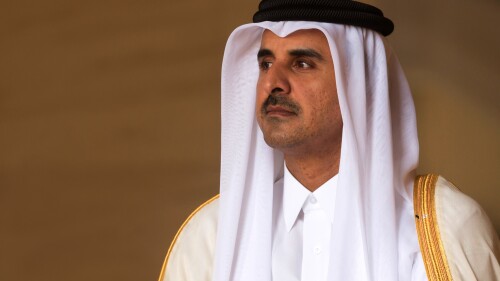Turkish President Recep Tayyip Erdoğan was forced to suspend his election campaign events on Wednesday after abruptly falling ill during a live television interview.
Erdoğan tweeted after the appearance, “Today I will rest at home upon the advice of my doctors... with God’s permission, we will continue our campaign from tomorrow onwards.”
His sudden illness forced him to cancel a live appearance for the opening ceremony of a Russian-owned nuclear power plant in southern Turkey and comes amid a high-stakes Turkish election that is expected to come down to the wire.
An election triumph by a former civil servant dubbed the “Turkish Gandhi” on May 14 over Turkey’s strongman leader Erdoğan – who has controlled the levers of power for 20 years in the strategically important country that straddles the Mideast and Europe – would have far-reaching implications for U.S. foreign policy interests.
Elections polls show a razor-close race between Erdoğan and his social democratic Republican People’s Party competitor Kemal Kilicdaroglu, who recently declared that he is a member of the persecuted Alevi Muslim minority community within a country dominated by Sunni Islam.
The 74-year-old Kilicdaroglu, who heads an opposition group of six parties, had recently been slightly ahead of Erdoğan in recent polling. However, two polls last week showed Erdoğan ahead.
Michael Rubin, a Middle East expert for the American Enterprise Institute, who has written extensively about Erdoğan, said if Kilicdaroglu dislodges Erdogan, “It would absolutely be a good thing” for the security interests of the U.S. and American allies.
Rubin said, “The sooner Erdoğan is gone, the quicker Turkey can recover. The danger is that so many diplomats and security officials believe simplistically that the problem in Turkey is just Erdoğan rather than a much broader ideology and twisted historical narrative. The United States must base its policy on Turkey’s behavior, not wishful thinking or the assurances of retired American diplomats who have a personal financial interest in Turkish businesses and close ties.”
The 69-year-old Erdoğan has picked major fights with the U.S. over the decades, ranging from barring American troops from utilizing Turkish soil as an entry point to invade Iraq in 2003 to launching Turkish military strikes on the U.S.-allied Kurdish forces who helped America oust the Islamic State.
Uzay Bulut, a Turkish analyst and research fellow for the Philos Project, sees an uphill battle to repair American-Turkish relations. Erdoğan’s attacks on U.S. foreign policy have generated intense anti-Americanism in the nation of just over 85 million people.
Bulut told Fox News Digital, “More than 94% of the people who spoke to the Areda Survey in 2021, for instance, said they do not believe that the U.S. is a friend to Turkey. According to various polls, the United States leads the list of most hated countries among Turks.”
She added, “Expecting the opposition to implement a pro-U.S., pro-NATO or pro-EU foreign policy would not be very realistic. Just like Erdoğan, they will do whatever they believe their national interests require them to do. And this includes supporting China or other authoritarian regimes”
Importantly, Bulut said, “I don’t think a free and fair election is really possible in Turkey. Erdoğan seems capable of doing anything to stay in power, including stealing the elections or causing violence in society in the event of his defeat in elections.”
Rubin echoed Bulut’s view about a Kilicdaroglu government withdrawing Turkish troops from Syria, stating, “Wishful thinking about Turkey is a chronic disease among American diplomats, and epidemic among Turkish expatriate journalists.”
Rubin said, “Erdoğan is no democrat. Period. He will cheat. He will manipulate. He will deny. He will calculate that the European Union will eventually give in, whether because many countries fear a wave of refugees pouring across the Turkish frontier or because Germany knows Erdoğan can activate terror cells among the Turkish diaspora in that country. As for the United States, Biden’s record at holding firm suggests a serious need for diplomatic Viagra his advisers are not willing to prescribe.”
In an April, 18 column in the pro-Erdoğan newspaper The Daily Sabah, Burhanettin Duran, a professor at Social Sciences University of Ankara, tackled the “Difference Between Erdoğan and Kilicdaroglu.” Duran wrote that “Under Erdoğan leadership, Türkiye has been among the most active countries in this new global and regional chapter.”
Duran, who is a member of the Turkish Presidency Security and Foreign Policies Council, continued, “By contrast, Kilicdaroglu remains unimpressive, mainly in foreign policy, national security and national defense. His party has not made any severe pledges except dialogue with Syria and launching a new regional organization in the Middle East.”
Kilicdaroglu’s striking resemblance to the Indian nationalist leader Mahatma Gandhi, along with his low-key demeanor, earned him the nickname “Turkish Gandhi” or “Gandhi Kermal.” When he was assaulted in the Turkish parliament in 2014 via punches to the face causing bruises, he told his fellow MPs to relax, declaring, “The path to democracy is full of obstacles.”
Erdoğan’s handling of the horrific earthquakes in February that killed more than 50,000 Turkish residents has placed question marks over his role in construction safety in a region long vulnerable to earthquakes. The combination of alleged lax safety standards during Erdoğan’s building boom and a reportedly defective relief effort after the earthquake are burning campaign topics.
Rubin, the Turkey expert who is a fierce critic of Erdoğan, argues that “after 20 years of Erdoganism, the problem is no longer one man but the entire system. Erdoğan has both reshaped the bureaucracy (in) his own image, and he has also demonstrated to the opposition what a potent tool unhinged Turkish nationalism can be. Erdogan has left an economy in tatters, one that won’t be easily fixed.”
The confluence of perhaps the most pivotal election in Turkey’s history, coupled with the 100th anniversary of the founding of the Turkish Republic in 1923, has electrified commentators, Turks and observers of the Ankara’s complex politics. The stakes are high for the U.S., NATO, the volatile Middle East and Europe.








